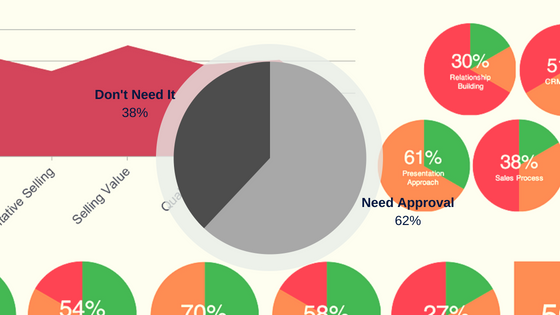
When a salesperson has a high need for approval, it means he or she would rather be liked by their prospect than to close the sale.
Sales DNA is a combination of elements that support or sabotage a representative’s sales efforts. In contrast to technical selling competencies that are more practical and theoretical and much easier to work on, Sales DNA is like the genetic heritage of a salesperson. It takes time, effort, discipline and patience to change things that affect performance.
The need for approval is an element of Sales DNA.
When evaluating your salespeople’s need for approval, you’re evaluating to what degree the need to be liked and appreciated impacts the ability to close a sale. A 100% rating in this finding means that there’s no need for approval, or that it doesn’t affect the ability to close the sale.
That’s the strength you need to encourage in your salespeople.
The need for approval is typical of salespeople

Sales force evaluations show us that salespeople often have a strong need for approval. They get into sales because they enjoy creating relationships with others, communicating, being surrounded by people and enjoy being appreciated and liked. While it’s not systematic, it’s quite common.
It’s no wonder that 62% fail to get the 100% mark in this particular element of the Sales DNA.
What’s the need for approval?
“The Objective Management Group need for approval finding tells us to what degree a salesperson needs to be liked, or in severe cases, loved. They will have more trouble asking questions, asking tough questions and to have the difficult conversations that nobody else has had; all prerequisites for being able to sell consultatively.” – Objective Management Group
In other words, a high need for approval means salespeople seek first and foremost to be appreciated by prospects and customers, instead of trying to gain their respect.
A representative who has a high need for approval will not be able to push the conversation as far as he or she should with clients. One of the essential elements of consultative selling is the ability of a salesperson to ask many questions at the right time and to ask difficult questions that the prospect isn’t used to hearing. When a rep would prefer not to go too far for fear of displeasing or losing the sale, he or she quickly runs out of questions to ask to move the sales process forward.
Where does the need for approval come from?
The need for approval is not specific to sales; it’s a question of personal growth and development. It’s a primal need, and being without this instinct would inevitably affect our capacity to survive as a species. We surround ourselves with family and friends. We want to please them and be pleased in return.
A person’s need for approval has an impact on all of their relationships; positive if moderate, negative if situated in either extreme. Many books have been written on this particular subject, describing the impact that too high a need for approval has on relationships. It’s unhealthy, even harmful, to put such high importance on another person’s validation.
So, while it’s normal to want approval and to need to feel loved, the issue stems from where a rep looks for that validation.
Don’t rely on your prospects to fulfill your need for approval
There must be a clear understanding of where and when it’s appropriate to go looking to fill this need. It’s inappropriate, and counterproductive, to rely on a prospect or client to fulfill this need. That is the number one condition for the need for approval aspect of sales DNA.
A salesperson should look for it in colleagues, families, friends and sales managers, but never in clients and prospects.
To be a good salesperson, closing a sale must outweigh being liked, that’s the question we often ask concerning the need for approval. To score a 100%, closing a sale must be more important than to make their prospect happy.
What are the symptoms of the need for approval in sales?
- The representative doesn’t ask all the necessary questions;
- The representative doesn’t dare ask difficult and direct questions (e.g.: Mr. prospect, you mention having a problem with XYZ for X time, why is the problem still not solved?);
- The representative doesn’t dare disagree with the client;
- The representative is allergic to “No”;
- The representative seeks to be friends with customers;
- The representative doesn’t want to disturb or interrupt (occurs at the time of prospecting and at the time of obtaining a response);
- The representative “buys” the justifications of the prospects;
- The representative believes in the fake kind and positive words of prospects;
- The representative has a lot of trouble closing sales.
Consequences of high need for approval
The salesperson’s fear of displeasing the prospect makes them reluctant or unwilling to ask hard questions. They’re allergic to “no” so they following-up on opportunities they should have disqualified a while ago.
I often see salespeople that feel they need to choose between their prospect’s approval and being liked. Being liked and being likeable is different, though people with a need for approval issue tend to confuse the two.
Not needing approval doesn’t mean you have to be a jerk with everyone. In other words, having the confidence to challenge a prospect and also to be likeable are not exclusive. It’s quite the opposite – to be a proficient salesperson, they must go hand in hand.
I also hear sales representatives saying they need to build relationships with prospects. They tend to have a weak understanding of what makes healthy, lasting relations. These types of relationships are based on mutual respect, not on the fear of not being disliked.
“When a salesperson needs to be liked it prevents him/her from asking questions, pushing back and challenging conventional thinking.” – Objective Management Group
It becomes difficult for salespeople to be consultative when they need to be liked, as they’ll have a hard time challenging and pushing back. They can’t be consultative or prospect efficiently, since they’re often reluctant to ask tough questions, call back, or pursue a potential client, for fear of disrupting them.
This issue impacts every aspect of the sales process. Prospecting, qualifying and, of course, closing.
How to deal with the need for approval in reps?
Before you do anything, you need to identify the issue with precision and certainty by evaluating your sales force to get your answers.
Then make your representatives think about the following points:
- Do they make a clear distinction between their sales role and the person they are when they come home at night?
- Do they prefer to be loved by their client or respected for their level of professionalism and expertise?
Now, to specifically address the need for approval, know that your reps need to have a strong desire and commitment to perform in your sales role. Without this element, they won’t be able to do what needs to be done to address their need for approval.
The assessment will provide you with data on each person’s level of desire and commitment.
Practical exercises
With your reps,
- Change their approach so they start to seek out respect instead of their customer’s approval;
- Help them maintain a positive self-image;
- Help them get rid of their “happy ears;”
- Use precursors in conversations. Precursors are phrases that prepare salespeople and customers for a difficult question, for example.
Take away
Successfully dealing with a need for approval problem, like any Sales DNA defect, is done over several months, not days, by tiny increments. Because it took years to set in, it can’t be torn down with the snap of a finger.
Sales managers and representatives must be patient during this process. Remember that there is an opportunity to increase sales performance by 35% just by working on this Sales DNA component!
Because of the impact of solving a need for approval issue, PRIMA’s development programs, in addition to addressing technical sales competencies, focus on reprogramming Sales DNA.
Note: This post was originally published on May 25, 2018, and has been reviewed and revamped for accuracy and comprehensiveness.






